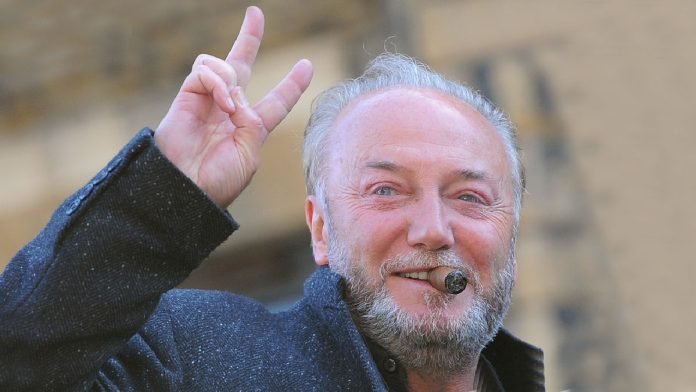A Remarkable Moment: George Galloway’s Impromptu Rhetorical Brilliance
In the cacophonous world of politics, moments of authenticity stand out like diamonds in the rough. While rhetoric and doublespeak dominate the airwaves, occasionally words emerge carrying weight far beyond partisan feuding. Such rare clarity reminds us that sincerity still survives in public life.
One such moment occurred in 2013 when George Galloway, the firebrand former Labour and Respect MP, activist and now leader of the Workers Party, faced an unexpected challenge during a debate at the Oxford Union. This confrontation brought forth a response that showcased Galloway’s rhetorical brilliance and unshakable moral conviction. His impromptu remarks offered deep insights from a long life spent fighting injustice.
Galloway was invited to recount his experiences as an undercover agent battling apartheid in South Africa. But he soon faced an accusation of racism from a student seeking to smear his reputation. In this charged instant, Galloway rose to the challenge with trademark passion and eloquence.
His powerful extemporaneous retort wove together the threads of a complex life woven into the anti-apartheid struggle. With razor wit, encyclopedic knowledge and sheer articulate force, Galloway outlined his personal investment in racial justice. He highlighted critical but overlooked roles of Jewish ANC members, daring his critics to rethink facile assumptions. Through vivid lived experience, Galloway exposed the realities of segregation’s violence.
In this electrifying moment, Galloway distilled the essence of his journey, from covert operative to unyielding parliamentary disruptor. It is this indomitable spirit that today’s activists can find inspiration in, a reminder of the enduring importance of revisiting the victories we achieve in an ever-evolving world marked by constant conflict. As Galloway’s longtime friend and comrade, Tony Benn, once wisely remarked, “Every generation must wage the same battles anew. There’s no ultimate triumph, and there’s no ultimate defeat.”
These profound instances are the rare diamonds of our political discourse, deserving of celebration. While the daily grind of politics often rewards the mundane, we must remember those whose words transcend the ordinary. Through his impassioned response, Galloway provided a masterclass in unwavering conviction and moral certitude. Let us carry forward the torch he has ignited with such brilliance as we continue to engage in the battles that matter most.
Are You Racist? | George Galloway | Oxford Union
Full transcript…
Tensions erupted when a student hijacked the debate, unravelling events leading to Galloway’s climactic remarks. The agitator initially spoke in Hebrew while concealing an object in his jumper. Sensing impending confrontation, Galloway warned the man not to approach, feeling threatened.
Confirming suspicions, the student revealed an Israeli flag tucked inside his garment. Declaring himself an Israeli, he accused Galloway of consorting with fascists in Beirut. Galloway instantly identified the interview on Press TV being referenced.
With razor wit, Galloway retorted: “You’ve earned yourself a lot of harm, you son.” As the student was escorted away, claiming refusal to debate racists.
Galloway contextualized the inflammatory flag waving as he quipped, “Well, it’s quite amusing; the last time I saw that flag was just last Saturday. You can find numerous sources on the internet to confirm this. The flag was being waved by the English Defence League in Bradford. It has been extensively covered in newspapers and news broadcasts. It’s quite remarkable when England’s far-right group chooses the flag of Israel as their preferred banner.”
This tense prelude set the stage for Galloway’s subsequent oratory masterclass. His sharp diffusal of disruption segued into an impassioned dissertation on racism and apartheid. By keeping calm against provocation, Galloway’s moral authority was only elevated.
Immediately after a second audience member rose to accuse George Galloway of racism, stating: If I said in a debate that I would not debate with a Pakistani, I would rightly be called a racist. My question for you is, are you a racist?
It was at this point George Galloway fell into his impassioned speech…
George Galloway: “Why are you applauding that? Why would you applaud that? What kind of people would applaud that? Am I a racist? You’ve sat through the last hour and a half of me speaking, and you’re applauding someone asking me if I’m a racist. What kind of people are you, or do you just applaud anything? Would you just applaud anything? You made a better job of it than your friend, I’ll grant you that. Talking to me in a language I don’t understand and then waving an Israeli flag in my face was not, I suspect, the finest moment that he will experience in what I hope is a long life in public affairs.”
“I’ll let you in on something you don’t know. I’m one of the few people on the left in Britain who travelled the length and breadth of apartheid South Africa as an underground agent of the African National Congress, led by Nelson Mandela. Then in Pollsmoor Prison in Cape Town, therefore, the subject of apartheid is particularly important to me. The question of racism is particularly important to me. And in parenthesis, let me tell you this: that throughout the entirety of my time underground in South Africa under apartheid, every house I slept in, every dinner I ate, every car I drove in was provided by Jewish activists of the African National Congress. So Jews don’t have to be on the side of apartheid. They don’t have to be on the side of racism. Jewish heroes amongst my blood brotherhood, like Dennis Goldberg, who served 27 years on Robben Island in Pollsmoor Prison but who never was able to touch Mandela and his comrades because they were on one side of the apartheid prison wall, and he and a few other Jewish heroes of the African National Congress were on the other. Dennis Goldberg, Albie Sachs, Joe Slovo, Ruth First. Perhaps you’ve heard of these people. If you haven’t, look them up. Jews don’t have to be on the side of apartheid; they can stand up against it.”
“And I say to those who imagine that they are friends of the state whose flag was just waved in my face: Turn away from the racist apartheid ideology of Zionism. Turn back to where Jews were before the emergence and the hegemony of Zionism. The greatest people on the earth were Jews, the leaders of the socialist, communist, trade union, liberal, enlightenment movements throughout the 17th, 18th, 19th centuries were great Jews. Marx himself was a Jew. None of them believed that as Jews they should go and take somebody else’s country and drive millions of them around the world as refugees. All of them would have turned their back against such an ideology.”
“But because of my experience in South Africa, which included, by the way, being battered and bloodied by a Scottish South African policeman called Campbell in Google Led Police Station in the Google-letter township in Cape Town, although the policemen had eventually to wash my feet in public in penitence, but that’s another story. Because of my time in South Africa, because of the decades that I worked against apartheid in South Africa, do you imagine that I would turn up at a university and debate apartheid with a supporter from South Africa of the apartheid system? I’d rather punch him in the face than debate with him. Why? Because apartheid is a racist poison. It is the worst kind of fascism, and I would never debate with any supporter of South African apartheid. Why should I debate with a supporter of Israeli apartheid?”
George Galloway’s response at the Oxford Union debate is a testament to his unwavering dedication to justice, his deep-seated beliefs, and his ability to articulate complex issues. It provides a window into the mind of a politician who continues to challenge established norms and inspire critical discourse, it was also a pleasure to listen to…
Support Independent Journalism Today
Our unwavering dedication is to provide you with unbiased news, diverse perspectives, and insightful opinions. We're on a mission to ensure that those in positions of power are held accountable for their actions, but we can't do it alone. Labour Heartlands is primarily funded by me, Paul Knaggs, and by the generous contributions of readers like you. Your donations keep us going and help us uphold the principles of independent journalism. Join us in our quest for truth, transparency, and accountability – donate today and be a part of our mission!
Like everyone else, we're facing challenges, and we need your help to stay online and continue providing crucial journalism. Every contribution, no matter how small, goes a long way in helping us thrive. By becoming one of our donors, you become a vital part of our mission to uncover the truth and uphold the values of democracy.
While we maintain our independence from political affiliations, we stand united against corruption, injustice, and the erosion of free speech, truth, and democracy. We believe in the power of accurate information in a democracy, and we consider facts non-negotiable.
Your support, no matter the amount, can make a significant impact. Together, we can make a difference and continue our journey toward a more informed and just society.
Thank you for supporting Labour Heartlands












